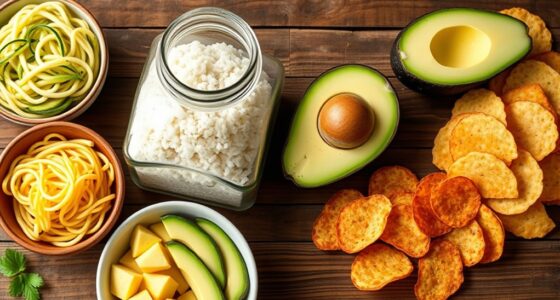Switching to a vegetarian keto diet is simple when you focus on low-carb plant proteins like tofu, tempeh, seitan, and edamame, paired with healthy fats such as avocados, nuts, and olive oil. Use unsweetened plant-based milks and dairy-free yogurts to keep carbs low and fats high. Incorporate low-carb vegetables for added fiber and nutrients, and plan your meals ahead to stay on track. If you keep exploring, you’ll discover how to make this diet sustainable and enjoyable.
Key Takeaways
- Incorporate low-carb, high-protein plant options like tofu, tempeh, seitan, and edamame into your meals.
- Use unsweetened plant-based milks and yogurts to add healthy fats and variety without exceeding carb limits.
- Combine plant proteins with healthy fats such as avocados, nuts, and olive oil for balanced, keto-friendly meals.
- Prioritize meal planning and prep to ensure consistent carb control and nutrient diversity.
- Carefully read labels to avoid hidden sugars and maintain a low-carb, high-fat vegetarian keto diet.

Have you ever wondered if you can follow a ketogenic diet without eating meat? The good news is, you absolutely can. Going vegetarian on keto might seem challenging at first, but with the right approach, it’s entirely doable. The key is to focus on plant-based proteins and dairy alternatives that fit into your low-carb, high-fat plan. These options help you meet your protein needs without sacrificing your vegetarian principles.
Plant-based proteins are your best allies here. Foods like tofu, tempeh, seitan, and edamame pack a punch of protein while remaining low in carbs. Tofu and tempeh are versatile and easy to incorporate into various dishes, from stir-fries to salads. Seitan, made from wheat gluten, is especially rich in protein and works well as a meat substitute. Edamame, young soybeans, are not only high in protein but also contain healthy fats, making them ideal for keto. Including these in your meals guarantees you stay full and maintain muscle mass without relying on meat.
Dairy alternatives are equally important. Many vegetarians rely on dairy for their protein intake, and luckily, there are plenty of keto-friendly options. Unsweetened almond milk, coconut milk, and cashew milk serve as excellent bases for smoothies and cooking, with minimal carbs. You can also find dairy-free yogurts made from coconut, almond, or cashew bases that are low in carbs and high in healthy fats. These alternatives not only add variety to your meals but also help you meet your daily fat requirements, which are essential for ketosis. Remember to check labels carefully to avoid added sugars, which can quickly derail your carb count.
Building a vegetarian keto meal plan involves balancing these plant-based proteins and dairy alternatives with healthy fats such as avocados, nuts, seeds, and olive oil. Incorporate leafy greens and other low-carb vegetables to add fiber and micronutrients without increasing your carb intake. Planning ahead is indispensable; preparing meals that include these ingredients ensures you stay within your carb limits while satisfying your taste buds.
Frequently Asked Questions
Can Vegetarians Get Enough Protein on a Keto Diet?
You can absolutely get enough protein on a keto diet as a vegetarian. Focus on plant protein sources like nuts, seeds, and legumes, but be mindful of carb content. Incorporate dairy sources such as cheese and Greek yogurt to boost your intake without exceeding your carb limit. Combining these options helps you meet your protein needs while staying in ketosis, making your vegetarian keto journey both easy and satisfying.
Are Plant-Based Fats Sufficient for Ketosis?
Did you know that plant-based fats can make up over 60% of a vegetarian keto diet? You’re asking if they’re enough for ketosis, and the answer is yes, when you include good sources like avocados, nuts, and seeds. These provide healthy plant-based fats and omega 3s essential for brain health. By balancing your intake, you can effectively stay in ketosis and enjoy a nutritious, plant-based keto lifestyle.
How Do I Avoid Nutrient Deficiencies?
To avoid nutrient deficiencies on a plant-based keto diet, focus on maintaining a micronutrient balance by eating a variety of nutrient-dense foods like leafy greens, nuts, and seeds. You should also consider supplement strategies, such as taking magnesium, omega-3s, and vitamin B12, to fill potential gaps. Regularly monitor your nutrient levels and adjust your diet accordingly to stay healthy and support ketosis effectively.
Is Vegetarian Keto Suitable for Weight Loss?
Imagine a vibrant plate filled with colorful veggies and healthy fats—that’s what vegetarian keto offers for weight loss. You can succeed with proper meal planning by focusing on high-fat, low-carb plant foods, even with dietary restrictions. This approach helps you shed pounds while respecting your choices. With discipline and creativity, vegetarian keto can be an effective, enjoyable way to reach your weight loss goals.
What Are the Best Keto-Friendly Vegetarian Snacks?
You’ll want to focus on keto-friendly vegetarian snacks that are easy for snack prep and pack a punch of flavor. Think about combining nuts with seeds, cheese, or avocado for rich flavor combos. Veggie sticks with high-fat dips like hummus or guacamole work well. These options keep you satisfied, support your keto goals, and make snack prep simple while offering delicious flavor combinations to keep things interesting.
Conclusion
Think of your vegetarian keto journey as sailing a sturdy ship through vibrant, uncharted waters. With every mindful choice, you’re steering closer to your destination—better health and vigor. Trust your compass, stay committed, and enjoy the scenic route of colorful plant-based foods. Before you know it, you’ll arrive at the island of wellness, feeling energized and fulfilled. Keep sailing forward—your vibrant, keto-friendly life is just over the horizon.









